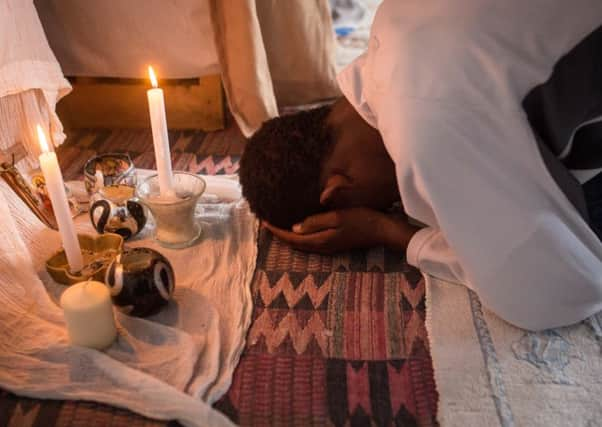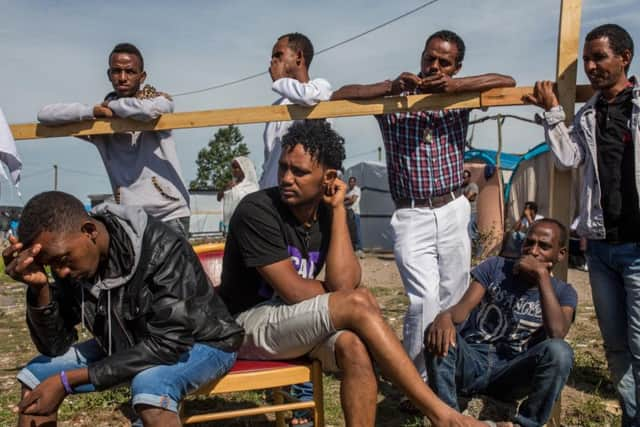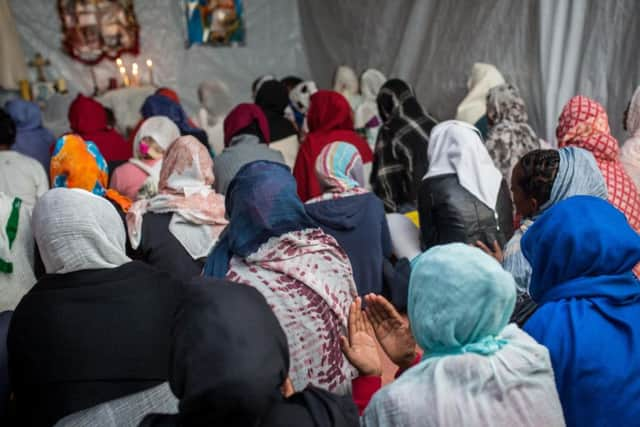UK and France to strengthen Calais border measures


French riot police sprayed migrants with chemical irritants after they tore down security fences at the Eurotunnel terminal in Calais on Saturday night.
Downing Street announced that the UK will fund additional private security guards, fencing and CCTV cameras to improve security at the terminal, while more French police are to be deployed to the border over the summer.
Advertisement
Hide AdAdvertisement
Hide AdAnd a consultation has been launched on stripping financial support from the families of migrants who fail in their applications for asylum.


Meanwhile, there was controversy over the cost to taxpayers of housing migrants who have arrived through the Tunnel, after contractors Serco confirmed that around 100 were being accommodated in hotels in the north-west of England as increased numbers outstripped available places in the community.
In a joint article for the Sunday Telegraph and French newspaper Journal du Dimanche, Home Secretary Theresa May and her French counterpart Bernard Cazeneuve called on other EU nations to take action to address the root causes of the chaos in Calais.
They said that solving the crisis was “the top priority” for both governments, but added: “What we are currently facing is a global migration crisis. This situation cannot be seen as an issue just for our two countries.
“It is a priority at both a European and international level. Many of those in Calais and attempting to cross the Channel have made their way there through Italy, Greece or other countries. That is why we are pushing other member states, and the whole of the EU, to address this problem at root.”


A long-term solution to the problem must involve persuading would-be migrants hoping for a better life in Europe that “our streets are not paved with gold”, they said.
Liberal Democrat leader Tim Farron urged David Cameron to reconsider Britain’s refusal to take part in a European Commission scheme to relocate those arriving in Italy and Greece by boat.
Setting out new security measures agreed following a phone conversation between Mr Cameron and President Francois Hollande, a Downing Street spokesman said yesterday: “The Prime Minister is clear he wants to see more security and tougher action at the border, which is what the measures agreed with France overnight are all about.”
Advertisement
Hide AdAdvertisement
Hide AdLabour has called on the government to demand compensation from Paris for truckers, businesses an holidaymakers hit by the disruption, citing Freight Transport Association estimates that the crisis has cost hauliers £700,000 a day. But Downing Street said the PM had made clear he would not “play the blame game”.
First Minister Nicola Sturgeon said the economic impact was “disproportionately severe in Scotland” costing seafood firms millions of pounds a week and placing orders in jeopardy. But she stressed: “Our primary concern over the current situation in Calais must be to play our part in addressing the underlying humanitarian issues. Increasing security at the Channel Tunnel, whilst welcome, will only help in the short term, and is not addressing the root cause of the issue.”
Responding to Ms Sturgeon’s letter, a Downing Street spokesman said: “We understand the problems faced by exporters and hauliers and are determined to do everything we can to bring the disruption to an end… We know the disruption is a particular problem for perishable goods and the Department for Transport is already working with hauliers and transporters to ensure these goods are prioritised.
“On the issue of relocation, the UK has long played a leading role in resettling the most vulnerable people and providing refuge in the UK. But our position on EU-wide resettlement schemes is clear, resettlement schemes are best run at a national level and we will continue to resettle the most vulnerable people under our existing schemes.”
Swedish migration minister Morgan Johansson said the UK “could do a lot more than the UK is doing” to respond to the migrant crisis. Sweden was currently accepting around 1,000-1,200 asylum applicants a week, he said.
The situation in Calais showed “a system that is breaking down”, he told BBC Radio 4’s World This Weekend, adding: “I see a country… who don’t want to take the responsibility that they should.”
Mr Johansson was critical of Mr Cameron’s rhetoric: “I hear what he is saying about ‘illegal immigrants’ and ‘swarms’ and I think he is trying to divide people, that is not a constructive way.”
But UK immigration minister James Brokenshire told the programme that the UK could be “proud of the contribution it has made to dealing with the crisis around the globe”, including by donating £800 million in response to the refugee crisis resulting from the war in Syria.
Advertisement
Hide AdAdvertisement
Hide Ad“I think the UK stands comparison in the work that it does on asylum with our intake, and actually has a proud record of offering humanitarian protection,” said Mr Brokenshire.
“The challenge comes when people are trying to gain access to the UK not for humanitarian protection but for gaining a better way of life.”